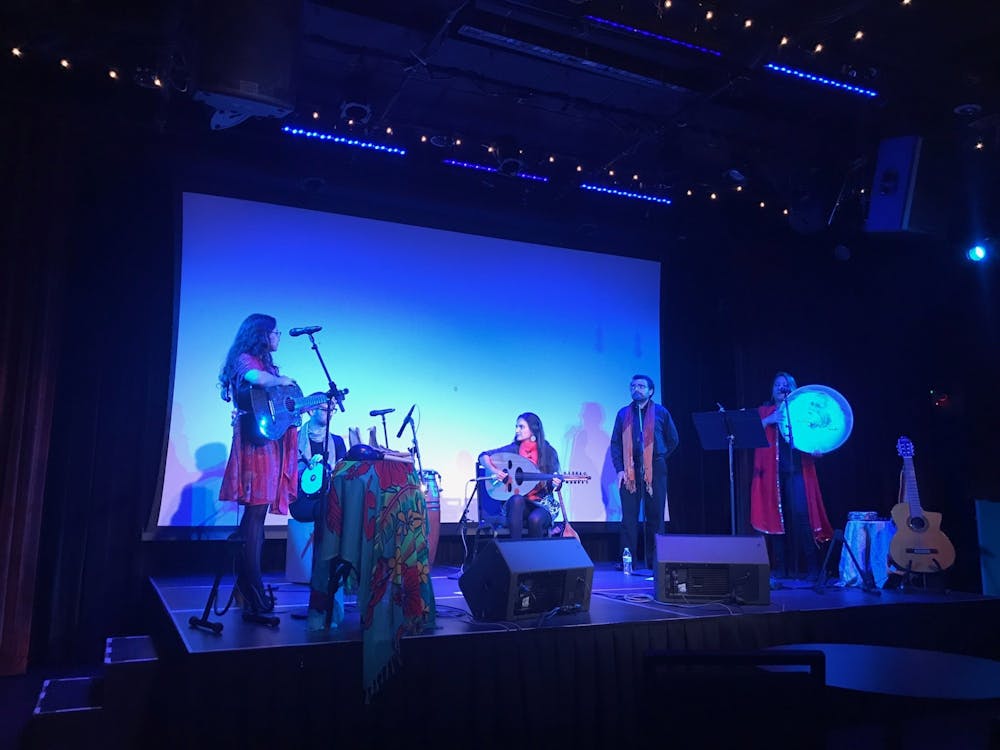This past Sunday, Nov. 10, “Not a Film Fest: Anticolonial Conversations in Baltimore” wrapped up with its third and final day.
Baltimore-Palestine Solidarity (BPS) presented the event, which began on Oct. 20 at the Baltimore American Indian Center and continued its second day on Oct. 27 at the 2640 Space before concluding this Sunday at the Creative Alliance in Patterson Park.
The three day event came to fruition under principal organizers Nani Ferreira Mathews, Danya Qato, Jeff Crabtree and Sammy Alqasem. Each day comprised of film screenings, art, conversations and receptions.
The diverse collective of organizers who imagined, organized and convened “Not a Film Fest” began coordinating this event over a year ago, after the group got together after a film screening to discuss The Battle of Algiers. The film retells the story of the Algerian revolution against brutal French colonial rule.
In an email to The News-Letter, BPS wrote that the discussion made participants think about the importance of screening films of similar subject matter.
“Our conversation on Battle of Algiers led us to imagine a space in Baltimore where films like it would screen and community partnerships would be built in the spirit of third cinema and the spirit of anticolonial struggle that centers the voice, agency, and stories of the oppressed,” BPS wrote.
Having received a grant from the Research Associates Foundation to support such a vision, the team worked collaboratively with community partners to sculpt out the event, running through hundreds of films and engaging in discussions to decide which films to screen.
“We were invested in sharing stories that reflected the organization of state power against ordinary citizens and the brave and persistent ordinary people who organized together and fought and continue to fight to disrupt this hegemonic power of the state,” the collective explained. “We were also interested in centering women’s voices, wherever possible, voices and stories that are often erased when the revolution is no longer televised.”
They also specifically chose to screen films that linked to issues in Baltimore City, including racism, imperialism, class divide, police and state violence, access to food, as well as gender equity.
The group’s year-long hard work paid off in the form of an exceptionally run event that gave voice to the globally underrepresented and misunderstood, exploring themes of social justice movements that have largely been unrecognized or misrepresented by the media.
In doing so, it emphasized ideas of reclamation, resistance, resilience, joy and justice in the face of anti-colonialism, anti-racism, anti-imperialism and anti-capitalism.
“We began each event with a land acknowledgement that ended with a call to action towards justice and reparations for the indigenous and Native communities of what is known by the rightful caretakers of this land as Turtle Island and acknowledged the legacy of slavery and racial capitalism that underlies the injustices and disparities against black people in our community,” BPS wrote.
Every detail mattered — even the food was purposefully catered from independent, women-led caterers such as Mera Kitchen Collective and Cocina Luchadoras.
The title of the event, “Not a Film Fest: Anticolonial Conversations in Baltimore,” is significant. The event was not just a film fest. It also aimed to stimulate conversation with the community and provoke debate.
By addressing the complexity of liberation struggles head-on, “Not a Film Fest” offered a uniquely honest take on our national struggles and how they can be put in conversation with other struggles pertaining to Muslim, Arab and black communities across the world.
The theme of the third and last day of the event was centered specifically around “Women in Resistance,” and the two films screened were Las Sandinistas! and Naila and the Uprising. Las Sandinistas sheds light on the women who joined the Sandinistas during Nicaraguan Revolution and how they now have to continue to fight for gender equity.
Naila and the Uprising is focused on the Palestinian women who came to the forefront of resistance against Israeli state violence in the First Palestinian Intifada. Both films sent a clear message — that the fight to liberate women globally is not yet over.
The incredibly thorough and careful planning of “Not a Film Fest” was evident in every moment of the event, from the second I entered the theater to the land acknowledgement statements, the screenings, the intermission between the films and the discussions that flooded throughout the room.
“Not a Film Fest” was truly more than just a film festival. It was an act of social justice that resurrected the stories that have been historically and continuously hampered and silenced. “Not a Film Fest” opened the door to understanding that liberation awaits.















